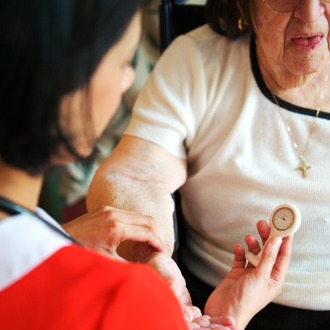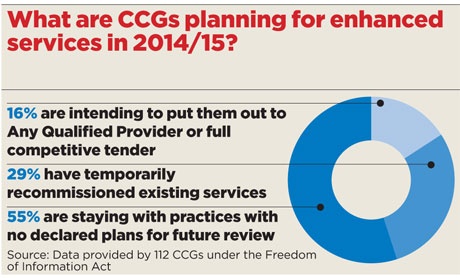Investigation: GPs given notice before LESs are put out to tender

GPs across the country have been told that they have months before their local enhanced services (LESs) could be opened up to the market.
A Pulse investigation finds 16% of CCGs say they intend to use some form of competition when recommissioning LESs from GP practices this year.
A further one in three CCGs plans to recommission LESs from local practices for now, pending a review – in as little as six months in some cases – about whether to use competition later this year.
This is concerning as LESs account for around 15-20% of practice income, and many practices are operating on a shoestring after cuts in MPIG and QOF income, and a below-inflation rise in global sum payments.
Public health contracts, such as sexual health or vascular screening, look particularly vulnerable to competition as local authorities cut their funding by an average of 1%. A fifth of councils approached by Pulse plan to put at least one LES out to tender. A further 27% say they have recommissioned services from GPs but will review the situation later in the year.
This means huge uncertainty for practices. Services could be put out to Any Qualified Provider (AQP) or a full competitive tender in a matter of months.
Opportunity:
But GP leaders say practices in areas where there is a delay have an opportunity to act to protect themselves.
For instance, NHS Stockport CCG told Pulse that it has given practices a stay of execution for six months to give them time to form a federation, and the local LMC has responded by leading a drive to collaborate.
‘It was a necessary defensive mechanism’
Paul Stevens, executive officer of Stockport LMC
Paul Stevens, executive officer of Stockport LMC and a member of the development committee for Stockport’s GP federation, Viaduct Health, says two-thirds of practices have already joined the new federation and it is expected to cover 80-90% of the patient population within a month.
Mr Stevens says: ‘It was a necessary defensive mechanism, so that if the contracts do at some stage go out to tender, then we are in a position to compete and ensure those contracts continue to be provided in a general practice setting wherever possible.’
He adds: ‘You can see this is happening across the country; you hear noises from within the CCG, and possibly from the local authority, suggesting this is their desired route of travel.
‘Added to the fact their administrative functions are shrinking, they don’t seem to be set up – or want to be set up – to manage 46 to 48 individual contracts with practices in Stockport.’
A CCG spokesperson says the move to delay competition for LES contracts – or community service contracts as they are now commonly known – will give patients ‘improved access to high-quality, community-based NHS services’ and gives the best opportunity to commission services ‘for the long term’.
This is pragmatic decision-making that other GP leaders are also seeing from CCGs elsewhere.
Dr Nigel Watson, chair of Wessex LMC and GPC lead on commissioning, says his local CCG has made it clear it is not interested in commissioning a phlebotomy contract with individual practices, but is keen to do it through a federation.
He says: ‘The CCG doesn’t want to do it with the individual practices – it wants to do it by locality. And we’ve got a provider organisation with 17 practices and they’re bidding on behalf of the practices.’
Dr Watson believes federations are likely to become more common, as a means of protecting practices’ interests and adapting to commissioners’ requirements.
He says: ‘If we’re going to move more services into the community, we’re going to work at scale, we’re going to integrate more with health and social care. If we’re going to do all sorts of things, we need to have bigger units to bid, or provide that work, to protect practices.
‘It’s not right for everybody, but for quite a lot of people, having a provider company is quite an important way forward.’
NHS Thurrock CCG, in Essex, has taken a similar route. It had planned to put all the LESs it holds with local practices out to tender via AQP but has instead offered practices a one-year grace period to group together.
The CCG will start the AQP process this month, a spokesperson says, but ‘has issued one-year contracts to incumbent providers to ensure continuity during this period and the ability of primary care to respond to AQP services’.
Tightening budgets:

Overall, CCGs are planning to boost funding for local GP services, with budgets for LESs rising by 4% in 2014/15, according to data Pulse has obtained under the Freedom of Information Act from 112 CCGs. For an average CCG, this equates to roughly £50,000 in additional funding for GPs.
This compares with a 1% cut overall planned by the 73 local authorities who answered Pulse’s request for information about their commissioning plans.
GPC deputy chair and Leeds GP, Dr Richard Vautrey, warns local authority budgets are ‘a cause for concern’.
He says: ‘Local authorities are under even greater financial pressure than the NHS. There would be a huge temptation for them to divert monies that were meant for primary care and general practice-commissioned services into other areas.’
In Manchester, the local authority’s budget is shrinking by 14% – including £200,000 removed from sexual health and NHS health check services. Manchester LMC warns this could be a sign of things to come.
Dr Tracey Vell, LMC honorary treasurer and a GP in Manchester, says local GPs have not felt the squeeze yet, but she has deep concerns over the future of funding nationally.
She says: ‘It is clear that primary care funding streams are under attack, as this Government seems to think GPs can take on endless work streams and responsibility for less pay. This will reach crisis point and fracture general practice as we know it.’
One area where practices may lose a significant amount of funding is Birmingham, where the local LMC claims a £100m super-service has been created by the local authority combining all its sexual health contracts into one five-year bundle, which is to be offered, via tender, to a single provider.
Birmingham LMC executive secretary, Dr Robert Morley, says GPs might miss out on funding because, unlike Stockport, they hadn’t got ‘their act together’ to put in a combined bid for services.
Dr Morley says: ‘There’s no specific GP federation; there are a couple of GP co-operatives and some large, merged GP partnerships. Certainly, there was an attempt to get a single, GP-led bid off the ground but because of different groupings of practices in co-ops, it hasn’t been possible to get a united GP-led bid.
‘Inevitably this means the successful bid will not be a GP-led, though I hope there might be some GP influence and partnership with general practice in respect of how the subcontracts are awarded once the decision has been made on the main contract.’
Shifting opinion:
Under NHS England procurement rules, CCGs have to put all LESs out to full competitive tender or AQP unless they can prove the service can only be offered by a single provider.
The rules, contained in section 75 of the Health and Social Care Act, caused a major furore across the NHS in April last year when they were finalised, with many warning they would result in practice income being devastated.
The chair of the NHS Alliance, Dr Michael Dixon, warned at the time that onerous competition requirements would lead to GPs abandoning CCGs, while Londonwide LMCs warned opening up LESs to AQP would destabilise practices and lead to mass redundancies of sessional GPs.
There had also been fears practices could be forced into complex and costly tendering against much larger providers, with the likes of Alliance Boots and BUPA thought to be planning to pounce on contracts.
But Pulse’s investigation shows this has not happened on a wide scale yet, although the fire sale may still happen after CCGs review LES contracts later this year.
‘I think there’s a very great understanding, from all political parties now, that integration is quite critical to delivering better care.’
Dr Sam Everington, chair of NHS Tower Hamlets CCG
Dr Sam Everington, chair of NHS Tower Hamlets CCG, and a GP in the same east London borough, says the figures indicate that opinion is starting to shift towards offering more integrated care.
He says: ‘I think there’s a very great understanding, from all political parties now, that integration is quite critical to delivering better care. And that inevitably will reduce the focus on competition.’
Dr Everington adds: ‘It’s good for patients. It’s about integrating care and delivering more of it in the community, making sure you have all the bits of the jigsaw supporting the patient. And at the end of the day it’s going to be cheaper than putting someone in a hospital bed, on average. So it’s a win-win really.’
But Dr Amanda Doyle, co-chair of the NHS Clinical Commissioners leadership group and chair of NHS Blackpool CCG, says there is still confusion among commissioners, who are facing daily tendering dilemmas.
Dr Doyle says: ‘Clinical commissioners have found a number of practical difficulties with the current system when trying to secure the best outcome for patients.
‘It is sometimes unclear whether they are simply free to commission from a market, or whether they have to commission in order to make a market operate. We would welcome further clarity on this.’
Experts say that as long as CCGs can defend their actions, they are protected. Dr James Kingsland, president of the National Association of Primary Care and a GP in the Wirral, Merseyside, says: ‘If CCGs can justify that having a registered list was an absolute requirement to provide a service and that nobody else could have done it, they’re on safe ground.’
What is happening to LESs?
- 1 in 3 CCGs is reviewing LESs before deciding on competition
- 3 CCGs are putting all their LESs out to tender
- 16% of CCGs intend to use competition when recommissioning LESs in 2014/15
- 1% cut in public health LESs on average by local authorities
- £50k average additional LES funding planned by CCGs in 2014/15
Source: Pulse approached all the CCGs and local authorities in England asking them for details about their 2013/14 financial year LES budgets and their predicted budget and procurement routes for 2014/15. We received responses from 112 CCGs and 73 local authorities.
Pulse October survey
Take our July 2025 survey to potentially win £1.000 worth of tokens











